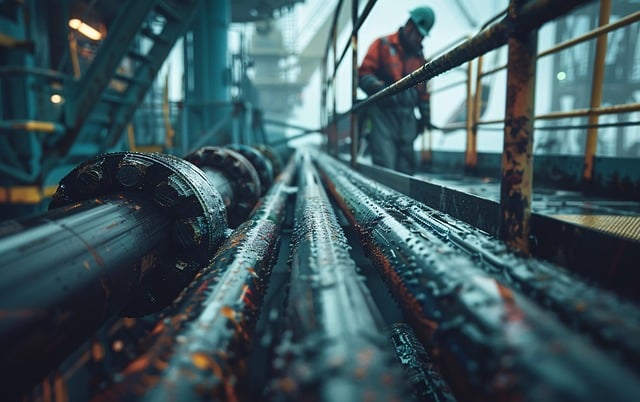Oil Beyond Earth|| The notion of extracting oil on other planets sounds like pure science fiction. Yet, it wasn’t long ago that the concept of flying to the moon was equally unimaginable—until humanity did it. As space exploration accelerates and missions to the Moon, Mars, and beyond become more realistic, the energy demands of these future endeavors are becoming increasingly critical. Could petroleum engineering, a field long associated with Earth’s energy needs, play a role in shaping the energy landscape of the cosmos?
Space oil exploration may not be as far-fetched as it seems. If humanity intends to colonize Mars, establish permanent bases on the Moon, or venture even further into space, reliable and sustainable energy sources will be essential. But could underground hydrocarbons, much like the oil beneath Earth’s surface, be part of the solution? Let’s explore the possibilities of space-based oil exploration and its challenges.
The Hunt for Extraterrestrial Hydrocarbons
Could oil exist beyond Earth?
Before we dive into the practicalities of drilling on Mars or the Moon, let’s address a fundamental question: Is there even oil in space? On Earth, oil and natural gas are formed from organic matter that has been subjected to heat and pressure over millions of years, and with Earth’s rich and diverse ecosystems, hydrocarbons are abundant. However, the situation on other planets may be different.
Astronomers and planetary scientists have been on the lookout for signs of hydrocarbons beyond Earth for decades, and recent discoveries have provided some intriguing evidence. Titan, Saturn’s largest moon, has vast lakes and seas of liquid methane and ethane. These methane lakes might not be crude oil in the sense we know it, but they are hydrocarbons nonetheless. Mars, our nearest neighbor, has also yielded traces of organic molecules, hinting at the possibility of ancient biological activity that could have led to hydrocarbon formation in the distant past. While we haven’t yet discovered crude oil akin to what we have on Earth, the mere presence of hydrocarbons points to the potential for space exploration in the future.

What If There’s No Oil? Could We Make It?
What if oil, as we know it, doesn’t exist beyond Earth? Could we still obtain usable hydrocarbons for fuel in space? While traditional petroleum reserves might be sparse or absent, humans may be able to synthesize hydrocarbons in space. Advancements in chemical engineering could enable the production of methane and other fuels by utilizing the abundant carbon dioxide (CO2) and hydrogen that can be found on planets like Mars. By leveraging in-situ resources, this synthetic production of fuel could become a sustainable energy source for space colonies.
Through processes such as the Sabatier reaction, which combines CO2 with hydrogen to produce methane and water, it’s possible to generate rocket fuel and other necessary fuels for long-term space missions. This could be key to reducing the need to transport large amounts of fuel from Earth to other planets, which would be costly and impractical. As we continue to advance in space technology, this synthetic fuel production could be a game changer for colonization efforts.
Applying Petroleum Engineering in Space
Drilling on Alien Terrain| Oil Beyond Earth
Petroleum engineers are specialists in extracting oil and gas from deep underground on Earth. Could these skills be adapted to extract resources from other planets, moons, or asteroids? The technology and expertise honed in deep-sea drilling and offshore oil extraction could potentially be applied to planetary drilling. NASA has already conducted tests with robotic drills for Mars missions, proving that digging beneath the surface of another planet is technically feasible.
However, the unique conditions of space will create several challenges for drilling equipment. Mars, for instance, has extreme temperatures, which can drop as low as -125°C at night, a thin atmosphere, and low gravity. These factors would make traditional drilling equipment ineffective in many ways. Yet, the petroleum industry has a history of working in extreme environments—whether it’s Arctic drilling or offshore oil rigs in the deep sea. Though the conditions on Mars or other celestial bodies are unlike anything on Earth, the underlying principles of petroleum engineering remain largely applicable.
For example, we already see the use of advanced robotics and automated systems in drilling operations on Earth’s offshore rigs. These same technologies could be adapted for remote planetary drilling. Specialized drills designed to withstand cold temperatures, reduced gravity, and other harsh conditions could pave the way for successful resource extraction in space. Also Read>>
Transporting and Storing Fuel in Space
Even if we are able to extract hydrocarbons on Mars, how would we transport and use them in space Oil Beyond Earth? On Earth, we rely on an extensive network of pipelines, refineries, and storage tanks to manage and distribute fuel. Space, however, lacks the infrastructure that makes these processes possible.
One potential solution is to build compact, lightweight refineries that can process crude oil and other fuels directly on the surface of other planets or moons. These on-site processing plants would need to be highly efficient and capable of refining crude hydrocarbons into usable forms like rocket fuel and other energy sources. Moreover, transporting fuel across vast distances—from Mars to Earth or to another colony—presents its own set of challenges. Current propulsion technologies would need to be augmented, and advancements in in-space refining could help minimize the need for transporting large quantities of raw materials.
The lack of an established supply chain in space means that future space missions will need to develop innovative and self-sustaining solutions for fuel storage, transportation, and consumption.

Alternative Energy Sources for Space Exploration
While the idea of space oil exploration is intriguing, it is important to acknowledge that traditional hydrocarbons may not be the best or most sustainable solution for powering space exploration. There are several alternative energy sources that could complement or even replace fossil fuels in space exploration.
- Solar Power: The sun is a nearly infinite source of energy. Solar panels could provide a sustainable and reliable power source for colonies on the Moon, Mars, and beyond. However, solar energy has limitations, especially in areas prone to dust storms or those located farther from the sun, like Mars. The challenges of weak sunlight and unpredictable weather patterns would require space colonies to find ways to store energy effectively and maintain power during less sunny periods.
- Nuclear Energy: Nuclear energy, in the form of small modular reactors, could offer a stable and long-term power source for space colonies. Nuclear reactors are already used in spacecraft for long-duration missions, and there is growing interest in using them for human habitats on other planets. Given their reliability and high energy output, nuclear reactors could be a cornerstone of energy solutions for deep space exploration.
- Hydrogen Fuel Cells: Hydrogen is abundant in space, particularly in the form of water ice found on celestial bodies like the Moon and Mars. Fuel cells, which convert hydrogen into electricity, could serve as another efficient way of generating power for space missions like Oil Beyond Earth. The production and storage of hydrogen fuel on other planets might be more feasible than transporting hydrocarbons from Earth.
Even if petroleum engineering doesn’t lead to a booming oil industry on Mars or the Moon, the technologies and principles developed by petroleum engineers could be instrumental in refining these alternative energy solutions for space environments.
The Future of Energy in Space: What’s Next?
As humanity’s ambitions for space exploration evolve from mere theory to a tangible reality, energy will play a central role in ensuring the success of off-world missions. Whether through hydrocarbons, nuclear power, or renewable alternatives, engineers—especially those with expertise in petroleum engineering—will be crucial in developing sustainable and efficient energy solutions for Oil Beyond Earth.
Could the oil and gas industry pivot to space? Some forward-thinking companies are already investing in extraterrestrial mining, asteroid mining, and other ventures that may eventually bring space-based resources into our reach. If humanity continues to advance in its space exploration endeavors, we may one day see an oil rig on Mars—or, more likely, a hybrid space exploration base that leverages a mix of fuels and technologies to ensure a reliable energy supply.
While the idea of extracting oil from planets and moons may still seem like science fiction, it’s clear that as we push the boundaries of space exploration, energy solutions—traditional and futuristic—will be a major focus. Whether it’s petroleum, solar power, nuclear reactors, or hydrogen fuel cells, engineers from a variety of fields will work together to power the next great frontier of human exploration.
What are your thoughts? Could petroleum engineering play a crucial role in fueling humanity’s journey beyond Earth? Or do you think alternative energy sources will take the lead? Let us know in the comments below!



